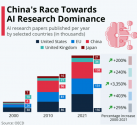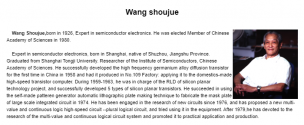There's 3 Nobels per year. There's more than 3 scientific breakthroughs per year. Thus it's clear to say that Nobels don't represent all scientific breakthroughs. And some Nobels turned out to be duds or harmful, like lobotomy.Please stop misrepresenting me. My claim is very specific: It is about science/engineering breakthroughs at the top 0.01% level, the kind which win Fields Medals, Nobels etc.
China can win the whole semiconductor tech race, including EUV, 2 nm chips etc. without needing to make a fundamental science breakthrough. Because it is applied science and engineering. Doesn't mean that it's not important, but just looking at a different segment.
I think this thing arose because of migration trends (which are directly relevant to demographics). Anyways yes, back to demographics, and we can discuss these again when the issue arises.
At the end of the day it's a human selected prize from a self anointed committee of white western scientists. They're experts but who can claim they're free of bias?
Koreans have 0 Nobels, is SK terrible? the only Nobels won by Indians are under the British Empire. colonial India was better for Indians than independence?
ImageNet is a manually labeled dataset... I mean how big of an innovation is it to come up with the idea of paying guys minimum wage to label data?The Transformers paper "All You Need is Attention" (2017) is a landmark paper that proposed the modern Transformers architecture, from a team of eight scientists at Google. The lead author is Indian. Six of the other seven authors are white men, some from Eastern Europe who immigrated to the U.S. to work at Google. All eight authors left Google to launch their own startups in the West.
It is based on an earlier paper by 3 authors, one Korean and two Europeans, from 2014 that proposed an attention mechanism. The paper was published in the U.S.
ImageNet and AlexNet were seminal breakthroughs in AI. ImageNet was from a Chinese American woman who immigrated to the US. AlexNet was from a Canadian team - as you mentioned. Word2Vec was a Czech guy who later immigrated to the US.
The major breakthroughs in Deep Learning in the late 2010s are mostly from the U.S. This is notable since many news articles claimed that China was publishing as many or more AI papers in the late 2010s. Even the ResNet paper was from Microsoft. China should reflect why it domestically is unable to come up with major breakthroughs in Deep Learning.



